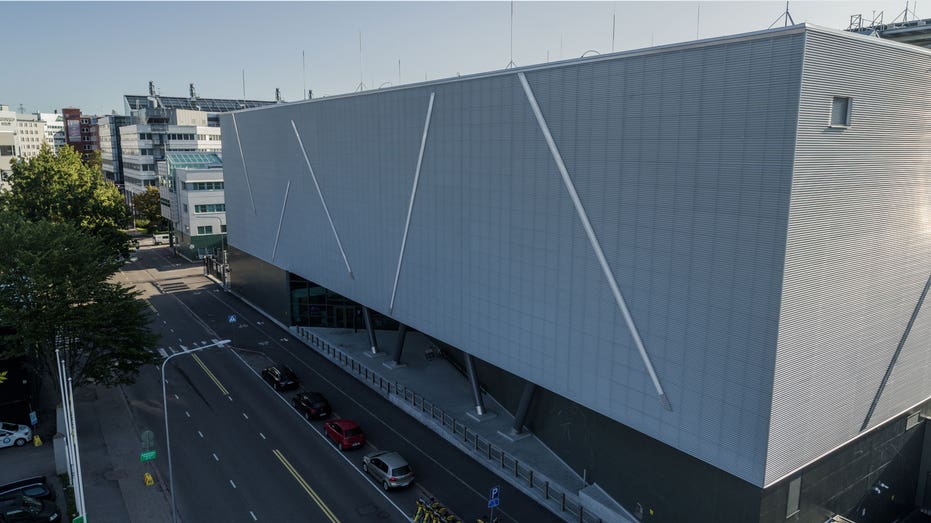A tradition of celebrating failure, plus the freezing weather that blankets this Nordic nation for much of the year, are among the unlikely key ingredients to its tech success.
Over the past 15 years, Finland has seen a huge expansion of data centers, which need icy cold water to keep vast server farms from overheating.
One of the biggest investors is Google, which has pumped more than $4.5 billion into Finland, primarily at its site at a former paper mill in the south coast town of Hamina.
Further inland, in the small city of Kouvola, TikTok will be moving in next year to a new custom-built data center with an investment estimated at $1 billion.
OLYMPIC SWIMMING POOL HEATED BY AI DATA CENTER
“From a data center perspective, we have everything you need: efficient government services, fast building permit processes and large plots of land suitable for industrial use,” Marita Toikka, Kouvola’s mayor, told FOX Business.
“We have the cool climate but also affordable, renewable energy, competitive taxation and a safe and stable society with excellent logistical connections.”
Data centers also come with a bonus for nearby communities. The heat they produce can be put back into communal district heating systems to keep homes warm during the winter, when temperatures plunge well below freezing.
A new data center built by phone company Telia in Helsinki can recover up to 90% of the heat it generates, enough to warm 14,000 duplexes.
“In Finland, we have the advantage of a cool climate and the possibility of almost year-round free cooling,” Kalle Hasu, Telia’s production manager for cooling and automation, said in a press release.
“Utilizing waste heat from data centers is an excellent example of an emission-free and consistent heat production solution that contributes to our goal of non-burning energy production.”

Finland’s most high-profile tech companies boast products like the Oura wearable smart ring or the popular mobile games from Angry Birds and Clash of Clans. But the country is also a hotbed for fintech and green tech development, defense, gaming, health and well-being innovation too.
At Maria 01 in the Finnish capital, Helsinki, there’s more than 215,000 square feet of space for tech entrepreneurs to launch their ideas. Taking over the site of a 100-year-old hospital, the startup hub has attracted hundreds of businesses in the last decade and developed a sprawling ecosystem that includes advisors, investors, startups and more established companies and brought in more than $1 billion in funding.
SEGA AGREES TO BUY ROVIO ENTERTAINMENT, CREATOR OF ANGRY BIRDS, FOR $775 MILLION
“We have new ideas incubated in old walls,” Maria 01 CEO Sarita Runeberg told FOX Business.
“In Finland, we have quite a high level of education, and we’re early adopters of new technology, so it’s been natural for us to develop engineering know-how and a startup culture,” Runeberg said.
But there’s one key moment in Finland’s recent economic history that has shaped its startup landscape today — the downfall of Nokia.
Once one of the most well-known brands in the world, the Finnish mobile phone giant declined rapidly in the late 2000s after its inability to keep up with new smartphone innovations and operating systems from Apple and Samsung.
NOKIA EXEC OPEN TO EXPANDING US MANUFACTURING TO AVOID TRUMP TARIFFS
It’s difficult to underestimate how important Nokia once was to Finland. According to the Research Institute of the Finnish Economy, Etla, Nokia accounted for a little more than 4% of Finland’s GDP and 23% of its total exports in 1999.
Around 60,000 people lost their jobs in Finland through redundancies at Nokia and related industries when things went sour, but that helped kick-start countless other new tech businesses.
“Nokia itself obviously was a great thing for the nation, and the downfall (was) horrible, but the downfall helped our startup ecosystem develop,” Runeberg said.
At Maria 01, she said, they see a lot of new founders still coming through from corporate backgrounds, “people who got laid off, they got a severance package and thought about setting up on their own.”
In October each year, many Finnish startups mark “failure day,” a unique celebration founded by university students that encourages entrepreneurs to view past failures as an essential part of their future success.
The startup community in Finland is cushioned by financial help from the government and local authorities, and Maria 01 is partly owned by the City of Helsinki. A new adjacent campus with triple the amount of space is being developed to make the Helsinki location the biggest startup hub in Europe.
NOKIA PICKS INTEL’S AI AND DATA CENTER LEADER JUSTIN HOTARD AS NEW CEO
Suvi Haimi is one of the entrepreneurs whose new company, Kuurai, is based at Maria 01.
With a background in biochemistry, Haimi and her team have developed a software solution for companies of all sizes that lets them easily manage regulatory compliance, supplier collaboration and product data management.
And she says that failure has been an important part of her entrepreneurial journey too.
“I suppose it’s already built into the education system here, and the way I have been taught by very good teachers is that it’s OK to fail. If you don’t ever fail, you haven’t taken enough risks to succeed big and to have a real impact,” she told FOX Business. She started her first business in 2016.
She also cites the demise of Nokia as a key moment in Finland’s development as a nation of entrepreneurs but highlights events like the annual Slush startup conference that attracts thousands of people and the biggest names in tech to Helsinki every winter. It’s an event embraced by startup hubs and co-working spaces across the city in a week-long carnival of tech ideas.
“It’s easy to create startups in Finland and failures are normal, but you need to learn from the failures, and you can’t be afraid of the uncertainty.”
Read the full article here


